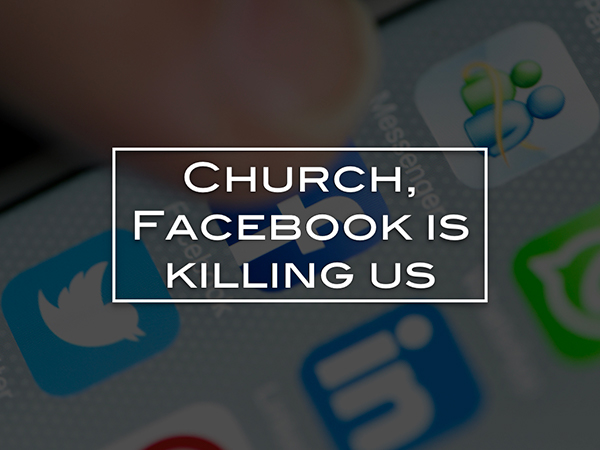By Jack Wilkie
Being a disciple of Jesus means orienting our lives around the two great commandments: love God with all your heart, soul, and mind, and love your neighbor as yourself (Matt. 22:36-40). The first cannot exist without the second, because without loving those around us we can’t possibly claim to love God (1 John 4:20). Unfortunately, we live in a world that is driving people further and further apart and making it harder and harder to love our neighbors (and our enemies).
We all notice the growing divide. But do we realize how much we can contribute to it by our Facebook posts and tweets? How we use those sites can go a long way toward affecting our own attitudes toward others, and others’ attitudes toward Christians and the church.
Though this doesn’t cover the entirety of the issue, here are three areas in particular where we need to be very careful of how we use social media.
Hiding behind keyboards
One of the most basic truths of human life is that we are all going to disagree with people at some point. It used to be that when we found out we disagreed with someone, we (in most cases) would either keep quiet or gently express that we hold a different opinion, explain why, and move on with life. Most of us would never even think to approach people in our community to mock them and question their intelligence for having different beliefs about some issue. Think about the effect that would have on the church’s influence in a community if its members were known for such volatile attacks on people who held different viewpoints. Now that we can all hide behind keyboards, though, it becomes all too easy. Every time I log in to Facebook I see Christians writing posts and sharing images that mock people who disagree with them on some kind of issue. Is that really how Jesus would act?
Jesus called us to be peacemakers (Matt. 5:9, Rom. 12:18). Sometimes – no, a lot of times – that means we’re better off just keeping our thoughts to ourselves. For example, the debates on gun control, athletes kneeling for the anthem, or Trump/Hillary will not be settled by you or me posting about them Those issues probably won’t be influenced whatsoever by our posts because debates aren’t won and minds aren’t changed through a heated online conversation. But our fellowship with another Christian could be hurt. Or a person who doesn’t know Jesus could be driven away. Take it from someone (me) who’s driven away dozens of people by posting controversial thoughts while hiding behind a keyboard. It’s not worth it. Try to see things from other people’s view, and constantly ask yourself if you’d be willing to say in person what you’re about to post online. Don’t hurt the church with your Facebooking or tweeting.
Inward focus
Sean Parker, one of the early leaders of Facebook, admitted that creating a false sense of validation and affirmation was one of the goals the company had when they designed the site. “It’s a social-validation feedback loop … exactly the kind of thing that a hacker like myself would come up with, because you’re exploiting a vulnerability in human psychology.” Another former Facebook exec said that “The short-term, dopamine-driven feedback loops we’ve created are destroying how society works.” In other words, Facebook was literally designed to give us a false sense of value upon which we would become dependent.
Once again, this leads us away from loving people. It causes us to be competitive and makes us envious of people we barely know, and it causes us to focus inwardly. We develop a need those likes and retweets, and it hurts when somebody else’s life looks better or their posts are more popular. The Bible helps us realize that feeling valued should instead come from enjoying a faithful relationship with God and having an outward focus to love those around us.
While I have no intention of claiming that Jesus and the apostles wouldn’t use social media, I know they wouldn’t be dependent on it. While they spoke to big crowds, much of their work was done one-on-one, face to face, hand-making disciples. That’s where we truly make a difference in people’s lives. One meal spent growing closer to someone from your congregation is worth more than a post with 10,000 likes or retweets. One chat over the fence with your neighbor makes more of a difference than an article with 1,000 shares. Ten minutes spent praying for opportunities to encourage the saints and reach outsiders does more good for people than a month spent scrolling through Facebook or Twitter.
Choosing our groups
The Gospel of Jesus is a Gospel of reconciliation. The cross knocked down the divisions between God and man, and subsequently man and man. In the age of social media, though, we almost revel in our ability to draw lines of division. If somebody has opinions I don’t like, I can unfriend or unfollow them. The result is that we end up surrounding ourselves with people who think just like us, who affirm our opinions and never challenge us. All the while, the people in our churches and neighborhoods become harder and harder for us to connect with.
We grow more like Jesus not by finding people who think just like us and narrowing our friendship to those people, but by finding the people God places directly in our lives and learning to “be patient and bear with one another in love” (Eph. 4:2). The local church will never be filled with people who think exactly like us. That’s by design. It helps us show the love Jesus commanded His disciples to have when we learn to be devoted to one another in love (Rom. 12:10) despite any differences we might have. That’s why it’s those local connections that we need the most. They are the ones that will challenge us. Facebook friendships rarely make us see our flaws, our impatience, our pride. Try to grow in Christian love toward the people around you geographically and you’ll find yourself being stretched and challenged in ways that Facebook friendships and shared interest groups just can’t provide.
Please don’t take this to say that all social media is bad or that we should all give up our accounts. Instead, I hope this article leads each of us to consider our actions and how we talk to people online, how we associate with people, and how it affects our real life relationships. Use social media as a launching point to create relationships that carry over into the real world. Never use your online presence as a roadblock for the lost or a dividing wall with your brethren. Above all, love your neighbor as yourself.
Church, Facebook is killing us



